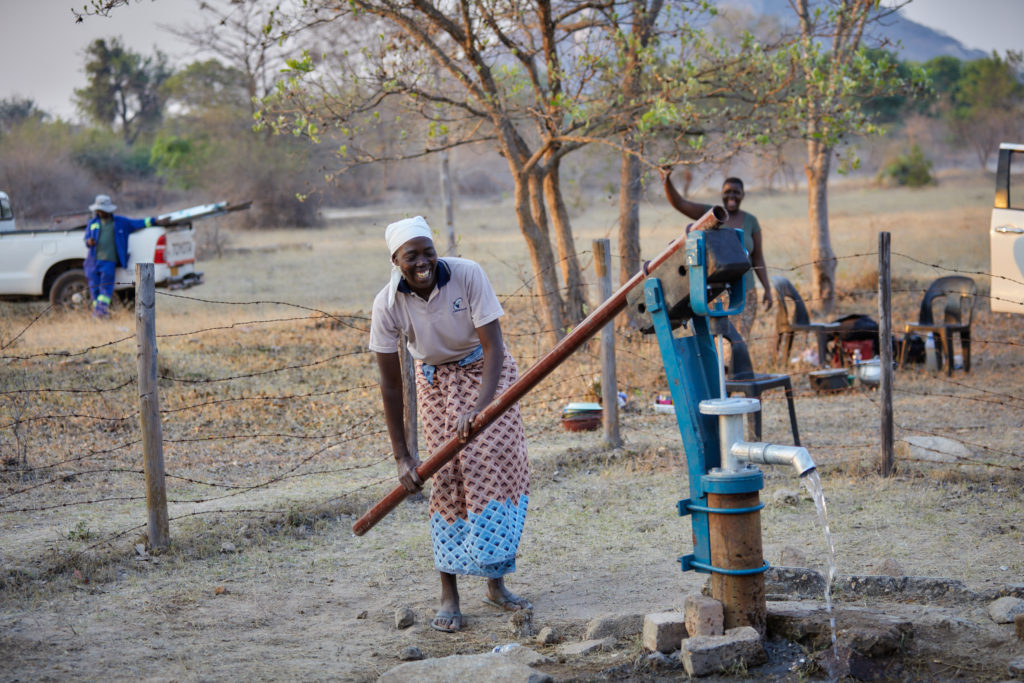“God’s water has not been enough for us….” How women are saving a community from thirst.
God’s water has not been enough for us, and we are preserving the only source we have’
Leroy Dzenga
It is almost 2 PM, the sun is emitting heat at its full might in Chindunduma, a village in the Marange area in Manicaland.
Pamela Chikonzo, a 48-year-old mother of five, is sitting a few metres from the community borehole, keenly watching the repairs being done.
She notes every action, and the technicians periodically update her on the depths they have achieved, the pipes they are changing – the works.
Pamela chairs the Water Point Committee, a grouping of villagers responsible for monitoring how the borehole functions and coordinating any response if there is a breakdown or challenge.
The borehole is a lifeline for the Chindunduma community, as they do not receive enough rainfall to sustain wells throughout the year.
Eighty-six houses, with an average of about 15 people and livestock, rely on this borehole for water.
In its absence, they draw water from a perennial river five kilometres away, putting them at risk of waterborne diseases.
Manicaland, the province where Chindunduma lies, has been hard hit by the ongoing cholera outbreak, and the village is among the hotspot areas picked by the Higherlife Foundation for borehole rehabilitation to manage the spread of cholera in rural communities.
Under such circumstances, communities with safe water sources, like boreholes, are less affected than those who draw water from shallow wells and rivers.
What makes the Chindunduma Water Point Committee unique is that all five members are women.
“There are a few men in this village; most travelled to look for work in cities. These water challenges are faced chiefly by women raising children, so we decided to take ownership of the water source,” she said.
This is why Pamela and her team committed to managing the borehole, a task she says she is up to.
“In this village, God’s water has not been enough for us. We tried digging wells in our homesteads, but they dry up quickly. If the borehole is not working, we must go to the river or travel more than five kilometres to get water,” she said.
It is this inconvenience which inspired her to join the Water Point Committee.
The Water Point Committees were introduced to ensure some degree of ownership and stewardship over the community boreholes.
“I joined the Water Point committee about 13 years ago. There have been personnel changes, but the community keeps choosing me to represent them,” she said.
The present committee comprises five women overseeing the borehole’s functioning, rallying the community if there is a challenge and imagining solutions to any difficulties that may arise.
In some ways, it can be a full-time job. However, it is a labour of love as they do not get paid.
Over the years, it became an unwritten expectation that the borehole would break down. This is because the community would finance the repairs, buying the cheapest possible parts they could get their hands on.
As was the case in 2016.
“We collected $1 from each household and tried to repair the borehole. It did not last long as we cut many corners, trying to make the little money we had to cover everything,” Chikonzo said.
The borehole was to malfunction again shortly after being repaired. It spiraled into a cycle of temporary solutions and imminent breakdowns.
The major breakdown in 2020 was more complex and needed more specialised repairs, which the Higherlife Foundation provided at the community’s instigation.
“We engaged with our councillor and told him that the water situation is now dire. He then took it up, and we heard that [Higherlife Foundation] had committed to solving our problem,” she says.
The area’s councillor, Mr Pindukai Muzivi, said the committee has played a crucial role in managing the borehole.
“The community picks these committees through voting. They select each other. Key attributes are sociability, literacy, and honesty. One should be able to give feedback to the community after engagement and also be able to speak to high-level people,” Mr Muzivi says.
Now that the borehole is working again, the community is resting its hopes on the committee to coordinate the community and ensure that there can be income generation from the borehole. If the borehole generates an income, it will be easier to fund reliable repairs when needed.
“I have been encouraging the committee to establish a green garden close to the borehole so that there is some commercial activity. People struggle for vegetables here, which can be a good opportunity,” says Mr Muzivi.
In addition to rehabilitating boreholes, Higherlife Foundation facilitated training for the Water Point Committees to be more effective.
These trainings are led by the Environmental Health Technicians in the district, who work closely with the Water Point Committees, and they cover management, record keeping, resource management and health education.
Without water, communities are vulnerable to diseases and related stresses.
Development partners will only sometimes be able to react to water shortages; this is why communities must learn to organise themselves to protect their water sources.
For Chindunduma, the absence of a borehole means a return to the river – a journey whose danger is known to all.


